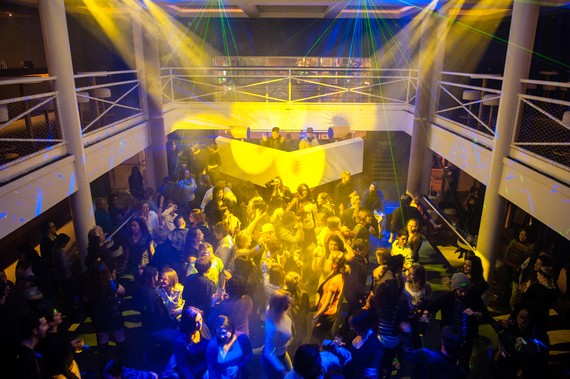Bars and nightclubs play a significant role in American society. Throughout history, they have served as safe havens for oppressed minority groups; incubators for aspiring artists; platforms to celebrate the music, fashion, and spirit of each decade; and catalysts for momentous sociopolitical change. From the Prohibition-era speakeasies, to Studio 54, to CBGB, to Stonewall, American bars and nightclubs have been the site of counter-culture revolutions that have dismantled boundaries between race, class, gender, sexual orientation, and, as author Lewis A. Erenberg stated, "even between life and art."
However, in recent years, there has been a considerable shift in our relationship to nightlife. Bar and nightclub attendance has been steadily declining, and new surveys are revealing that Millennials in cities all over the world are less interested in frequenting conventional nightlife establishments. The LGBTQ nightlife scene has not been immune to this new trend. LGBTQ brick and mortar venues, as well as pop-up dance parties, have been shuttering their doors across the country, as documented in a recent New York Times article Gay Dance Clubs on the Wane in the Age of Grindr. Nightlife catering to queer women has been hit particularly hard, with what's left of lesbian bars and nightlife spaces for a diverse range of women that fall under the queer umbrella disappearing faster than gay men's bars, a phenomenon that JD Samson explores in The Last Lesbian Bars:
With New York City Pride kicking off, I wanted to interview a panel of expert, preeminent DJs and event producers across the country who are keeping the nightlife scene for LGBTQ women alive and thriving via brick and mortar venues, pop-up dance parties, and festivals.
The Expert Panel:
Mariah Hanson, Club Skirts Dinah Shore Weekend in Palm Springs (CA): The Dinah is the largest lesbian event and music festival in the world. Located in Palm Springs, California, it attracts thousands of women from all over the globe. The Dinah is famous for celebrity sightings, awesome music, and good old fashioned girl watching.
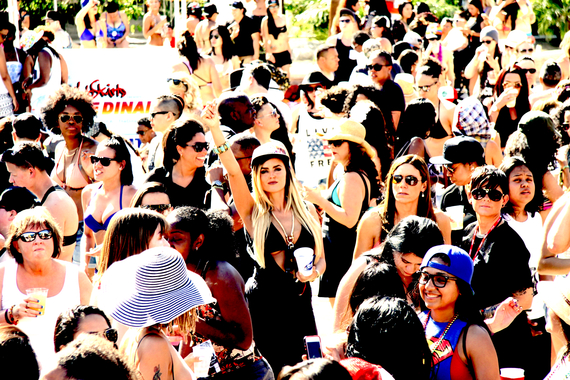
Image: Dinah Shore festivities courtesy Club Skirts Dinah Shore Weekend.
Whitney Day, Whitney Day Events (NYC): Born and raised in NYC and currently living the NYC/LA bi-coastal life, Whitney Day is a prominent lesbian DJ and event producer. Throughout the year, Whitney spins across the country and internationally, but her events are primarily based in New York, though she currently has some new West Coast projects in the works to be launched in the near future.
Whiney Day Events are large-scale (500-1,500 attendees) special events geared towards queer women, LGBTQ family, and ally friends. The events are multi-sensory experiences (art, lightshow, aerial, and dance performances) and heavily focused on music, which is why she is committed to exclusive programming and booking venues with the highest level of audio/visual quality possible. At the forefront of Whitney Day Event's mission is featuring female DJs and performers, opening doors that were formerly closed to this underrepresented group of artists by cultivating relationships with some of NYC's nightlife elite and consistently proving that women deserve to be showcased on coveted platforms.
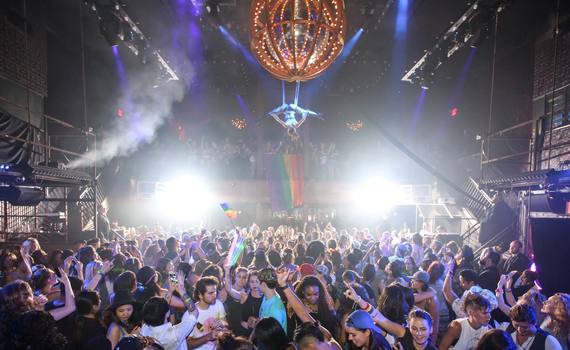
Image: Whitney Day annual Sunday Pride at Marquee captured by photographer Grace Chu.
Michelle Solórzano Daly and Kelly West, Lesbutante & The Boss (Texas): Established in 2013 by Purple Heart Army veteran Michelle Solórzano Daly (The Boss) and Kelly West (The Lesbutante), Lesbutante & The Boss (L&B) is an organization that produces a free monthly event for queer women every second Friday of the month in Austin, Texas at Highland Lounge LGBTQ nightclub. L&B events attract anywhere from 400-600 attendees. L&B also hosts smaller, more intimate monthly pop-up happy hours (100-200 attendees) at LGBTQ-friendly bars in the Austin area. L&B is currently producing Plezzure Island, the first ever all-female resort takeover in Galveston, TX. Plezzure Island is a joint venture with WolfPack Productions, founded in 2015 with Michelle and Kelly's two best friends, Gabby Ayala and Ashley Marshall.
Image: Lesbutante & The Boss monthly women's party at Highland Lounge captured by photographer Lisa Hause.
Emily Hall Smith and Charlotte Glasser, Hot Rabbit (NYC): Hot Rabbit is a queer dance party brand that promotes diverse LGBTQ nightlife events throughout Manhattan and Brooklyn. These events feature LGBTQ performers and DJs from around the world, and a variety of high-energy, positive dance music and performance styles. Hot Rabbit Fridays is held weekly at Boots & Saddle Drag Lounge in the West Village. Hot Rabbit's bi-weekly Saturday event, Bad Habit, takes place in Brooklyn at Lot 45 Bushwick. Hot Rabbit also occasionally produces other large-scale events for holidays, Pride month, and to benefit nonprofit organizations.
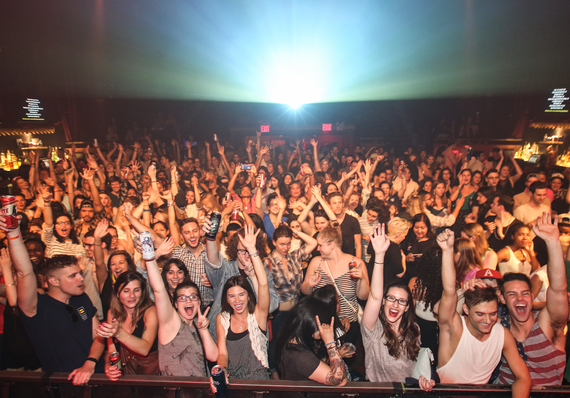
Image: Hot Rabbit annual Friday night PRIDAY event captured by photographer Grace Chu.
Kendra Walker, Joyous Hawkins, and Antionette Ketchum, Lesbians of Color (TX): Lesbians Of Color, Inc. (LOC) is a diverse, progressive social group for lesbians ages 25 to 65. Its organizers work tirelessly to advance a consistent presence and social scene for minority queer women in and around the greater metropolitan Houston, Texas area. LOC's events encompass everything from all-girl parties, museum exhibitions, arts shows, concerts, and book clubs, to social and professional networking affairs and more. LOC, commonly referred to as #Location, has created an avenue that brings positive, professional women together to have fun, meet new people, inspire success, and foster meaningful friendships, thereby raising the visibility of queer women of color in the community.
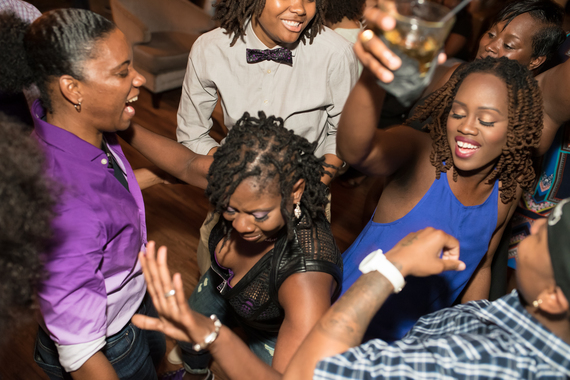
LOC party captured by photographer CJ Martin.
Christine De La Rosa, fiveTEN Oakland Events (CA, Hawaii): Christine De La Rosa (aka Miz Chris) is one of the preeminent producers of queer events in the US, primarily located in the Oakland/San Francisco Bay Area. Miz Chris is the owner of fiveTEN Oakland Events, which produces events for the LGBTQ community in Oakland and the East Bay, and EDEN Pride Events, which produces events in San Francisco and throughout the US. Her productions include long-standing yearly events, including EDEN during San Francisco Pride and fiveTEN Oakland Pride during Oakland Pride Weekend, as well as specialty events curated specifically for the queer community, like Queer Fashion Week, EDEN Pacific Northwest (PNW), and the new week-long event EDEN Hawaii.
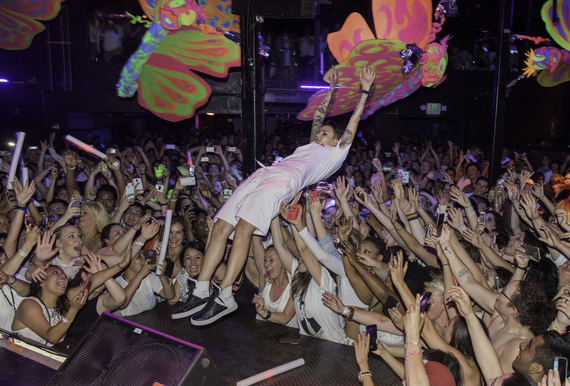
Image: Celebrity model, actor, and DJ Ruby Rose crowd surfing at Eden Pride captured by photographer Robert Silver.
Lisa Cannistraci, Owner of Henrietta Hudson (NYC): Located in NYC's West Village, Henrietta Hudson (HH) is the longest running lesbian bar in the country, celebrating its 25 anniversary in 2016. HH is an all-inclusive, lesbian-centric venue that offers a safe and exciting environment seven days a week for lesbians, as well as their friends and allies. HH also produces off-site special events, such as Siren Girl Pride NYC, which is held at the South Street Seaport and has a regular attendance of 2000+ women.
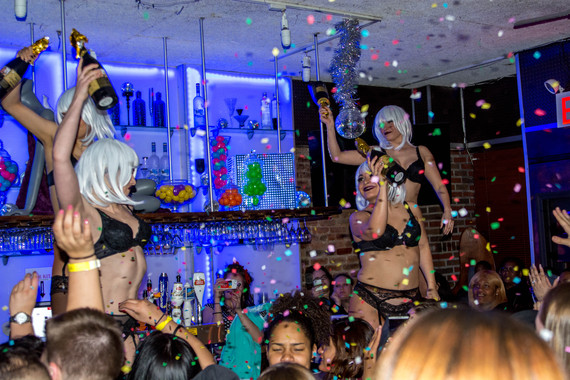
Image: Rox Republic burlesque night at Henrietta Hudson captured by photographer Shea Carmen Swan.
Do you believe that there is still a need for nightlife events that specifically cater to queer women? If so, why is it important to you that nightlife for queer women continues to thrive?
Mariah: Coming together as a community will always be important and nightlife is a critical part of that piece. We gather in clubs and bars to dance, celebrate, meet new friends, and renew old friendships. It will always be important to do this in spaces that are uniquely ours.
Whitney: There's not only still a need, but also a strong desire for nightlife events created with queer women in mind. We happen to be lucky living in a large liberal city [NYC], where, for the most part, we can be free to be out and open at any bar. Not true everywhere else in the US, obviously. And while most likely we will not be bothered by other patrons or bar staff at any old venue, it's a comfort knowing you have an event catered to foster a 'safe space' to kiss your girlfriend without getting gawked at or to use whatever bathroom you choose without judgement. Moreover, just knowing that a space was created intentionally for you by members of your own community makes it that much better!
In addition, I believe that nightlife catering to queer women can, and should be, inclusive. As long as the space and the women in it are respected, and everyone is there with right and good intentions, it doesn't have to be exclusively for queer-identified women, especially when many people in the community don't feel as though they neatly fit into the categories 'women', 'queer', 'lesbian', etc. I never create an event to exclude people who are genuinely there with love and support.
Lesbutante & The Boss: We strongly believe that there is a need for queer women-centered nightlife. The LGBTQ community and spaces have always been more male-centered because gay men socialize in a very different way than queer women do. In general, women go out less and are more particular about where they spend their money. Creating a space specifically for women on a bi-weekly or monthly basis allows for the building of relationships that are imperative for community.
Hot Rabbit: We think that creating spaces that feel inclusive for queer women and also for a diverse cross-section of the LGBTQ community is important in 2016. Our communities have been increasingly blurring the lines of gender and sexuality along a spectrum, creating a larger and larger variety of definitions of what it means to be a gender minority or sexual minority in this country. And as people are coming out at earlier and earlier ages and creating diverse friend groups within that LGBTQ umbrella, the need for women-only spaces has naturally declined. And even though people don't recognize it as such, the prevalence of men-only spaces has also declined. But the existence of LGBTQ-owned bars and clubs remains an important tool in us finding places to gather and feel like we are part of a community.
Miz Chris: I believe that there is always a need to be in spaces with your people and your allies. I live in Oakland and as a queer woman I feel comfortable going into most public spaces because Oakland as whole is a city that is open to all types of people. And even with that openness, sometimes I really crave spaces that have been created and curated just for me and other people like me.
LOC: Yes, there is still a need for nightlife events that specifically cater to queer women! Currently and historically, women's issues and needs are the most under-represented in America. Consequently, minority lesbian women often times are ignored by the media and social networking sites, or, even worse, rejected all together. This leaves a void in spaces where professional, mature lesbian women of all cultures can showcase their styles, relationships, nightlife and entertainment. In order to breed success among the younger queer generation, it is imperative that positive images and activities are curated for those who love and have life dynamics similar to each other.
Lisa: There is most definitely a need for nightlife events catering to queer women to solidify the sense of community and to feel safe to be who we are in an open and uninhibited forum.
What are some of the factors that you see as contributing to the decline in queer women's nightlife? Why do you think your event/brand/venue has been so successful in surviving in this tough market?
Mariah: As we continue to progress in terms of social acceptance and our civil rights, we will feel less of a need to hang out in places that are exclusively ours on a consistent basis, which is why events like The Dinah become even more important. At The Dinah, we take five days out of the year to celebrate what is uniquely ours!
No other event in the world puts together such a perfect combination of weather, location, diversity and talent. It also helps to be the number one event in the world for women. We are on the bucket list for most lesbians. The Dinah is the grand dame of all lesbian festivals and, in fact, many of the large lesbian events around the world are modeled after The Dinah. Palm Springs loves The Dinah and works in tandem with us to present an incredible festival.
Whitney: Nightlife is always changing. There's an ebb and flow in this industry, and the changes in nightlife that we're experiencing today have a lot to do with how we're socializing. People are spending more time on social media or watching Netflix instead of going out. They're using Grindr or Tinder or HER to find a date or hook-up. These things aren't unique to NYC. These changes are impacting nightlife everywhere. In addition, there has been a change in focus for Millennials and GenYs, with more value being put towards experiences, such as travel. So now, when people go out, they don't feel the need to do so every week, but rather just on an occasional night out for a special experience. They don't want something they could just do at home, namely throw on Spotify playlists and drink a few beers.
Noticing this shift, I moved my events away from the repetitive weeklies and even monthlies and instead began building bigger events 5-10 times per year. Doing so not only speaks to the current market, but also allows me to put more time and more budget into each event, keeping it fresh with different locations, sized venues, DJs, and performers each time.
Above all, I love what I do. It's a crazy career and a wild lifestyle, but I take it seriously from both an artistic and professional standpoint. From DJing to producing the events, I'm always pushing myself and try to one-up each and every event I produce.
Lesbutante & The Boss: The city of Austin is extremely LGBTQ-friendly, therefore lesbian bars have a difficult time thriving because women can go anywhere in our city and be their true selves. Hosting bi-weekly or monthly events, depending on the city, has seemed to be the best business model when it comes to creating spaces for queer women to connect and enjoy each other's company. I think we have been successful in this tough market because our events are community driven, not financially driven. We made the decision to make our events free because this was something that Austin needed, and it was our way of serving the LGBTQ community.
Hot Rabbit: An increasing public acceptance of LGBTQ rights and identities has made people feel more comfortable spending their time in mainstream non-LGBTQ spaces, which is a positive change in our world as a whole, but definitely a hindrance to queer-only spaces maintaining the income they need to survive. But young people, who are the primary demographic for nightlife, are forming more integrated friend groups within their own LGBTQ circles that create a demand for spaces where those groups can all party together, and we think we've proven that creating spaces that feel fun and safe for queer women do not specifically need to cater only to queer women or to exclude other identities.
Miz Chris: I believe our queer culture is shifting. While I believe there will always be a space for nightclubs and dance parties, I think we, as a community, have a hunger for more experiential events that encompass all of our senses and take into consideration our different needs. What I wanted to do as a 21 year old is very different than what I want to do now. But regardless of age, we all want memories instead of moments. Or at least that is what I want.
For my events, I have carefully curated a diverse portfolio and constituency to ensure that there is something for everyone. I believe this commitment to diversity has helped us thrive in this tough market. EDEN during SF Pride is a weekend of events encompassing dance parties, live music and the women's stage at SF Pride. fiveTEN Oakland Pride is a one day event that acts more like a festival than a dance party, engaging DJs, artists, vendors, performers and visuals to "wow" our attendees. Queer Fashion Week (QFW) is a week of fashion, workshops, and vendors specifically from our queer community. And while there are after parties produced by our QFW partners, our focus is on queer fashion and what that means to us. EDEN PNW and now EDEN Hawaii, which launches in 2017, are both about experiences, traveling, excursions, events and vacation. So there is a little something for everyone to enjoy.
LOC: Lesbian nightlife is declining for several reasons. There is a general lack of investment in entertainment catering to women. Hosting events can be very expensive without sponsors and there is a great degree of difficulty to get sponsors to invest in the lesbian community. Additionally, the availability of venues that are inclusive of the lesbian community is minute. Finally, the lesbian community itself has to become more inclusive. For example, as society becomes more accepting, the next generation of lesbians who are not into "labels" find it easier to assimilate into the heterosexual nightlife more so than the lesbian scene. Lesbian nightlife has to evolve with the times. Queer women want more than a party; they want an experience.
Our success is due to the creation of a nonjudgmental, positive environment catered to the minority lesbian community. We make sure each event has several elements full of excitement and passion that any age or culture would enjoy.
Lisa: There are economic issues, like escalating rents in major cities. It's also my understanding, through reading, that the imminent closures of bars in smaller cities and towns are due to lesbians opting to move to more inclusive cities to be "out" and raise families. With the advances in marriage equality, we are more visible and accepted by mainstream society and can meet and be social in a neighborhood pub. Like any assimilation, it reduces the need for an exclusive place to be who you want to be.
As for Henrietta's success, I am often asked this question and it always goes back to brass tacks. My upbringing in Park Slope Brooklyn in the 1960s was a classic middle class experience. My mom stayed home while my dad was a fireman. My parents taught me how to manage on very little [and] how to plan and make adjustments when it was called for. I have used this philosophy every day for the past 25 years while running Henrietta's. I feel that running my business, which happens to be a lesbian bar, is really no different than running any other small business in New York City. It's difficult and takes a whole lot of attention.
What are some of the benefits that the community derives from attending pop-up events hosted at various venues that are not specifically queer-owned and operated, as opposed to frequenting brick and mortar queer-owned and operated women bars/clubs? What are some of the cons of not having brick and mortar queer women's bars/clubs available to the community?
Mariah: The challenge to brick and mortar lesbian bars is the pop-up event. The changes, new venues, and different parts of town that come with pop-up events all bring a level of excitement that is hard for brick and mortars to compete with. It's a catch-22 because our brick and mortar bars are important, but we are not supporting them.
Whitney: Both are important to have. I personally fall into the former category, and the reason I like it is because I love taking over spaces that on a regular night my crowd wouldn't go to. Most likely they've never been to the venue where my events are held at, so to me that makes them unique and different right off the bat.
As for lesbian brick and mortar bars, I have the utmost respect, particularly for the owners. It must be a lot of pressure to have to sell enough drinks and door covers every night in order to stay open. Very long days and nights, 7 days a week / 365 days a year, and the constant stress of having such a huge overhead!
Lesbutante & The Boss: The pros of pop-up parties are (1) the experience of a new venue you may not have visited before, (2) knowing that a particular venue is LGBTQ-friendly, (3) increasing our visibility to the entire community of Austin beyond our small LGBTQ portion of it. The cons of pop-up parties are (1) you miss out on the organic, spontaneous evening out without having a pre-planned event and (2) as a promoter, we work harder to find spaces that are safe for queer women.
Hot Rabbit: Obviously one of the biggest benefits of pop-up queer events in venues that are not specifically queer is the diversity of options being offered to the queer community that previously had a set - and repeatedly used - number of available safe spaces. And another benefit of the surging prevalence of mixed-queer events is that these events foster a better understanding of and communication between groups that previously may have felt more segregated and therefore more judgmental of one another. Even though these mixed queer spaces are not women-only, they are overwhelmingly feminist, and built on pillars of mutual respect between people of various sexual minorities and gender minorities. But the downside of these pop-up events is that access to them requires people to be "in the know" more so than access to full-time LGBTQ spaces, which is a hindrance to both the producers attempting to disseminate the information and the consumers who would benefit from receiving it.
Miz Chris: I think we need both and I hope we don't lose either. Pop-ups are great because we get to introduce new spaces that are not necessarily available to us, and that provides variety and incentive. Personally, I feel like we should take up as much space as we can. It is the way to be part of the community that surrounds us. I know for my events, which are mostly hosted in multiple venues throughout the West Coast, I am grateful to be able to provide these beautiful, designated spaces to the queers that come from all over the US, Europe, and our own back yard to attend our events.
However, brick and mortar venues are equally important. They are our staples, our safe havens, the places we go to find comfort, friends, lovers and so much more. They are localized meeting spaces, community centers, support groups, and they are always there. We don't have to wait for a specific date to find each other. I have been heartbroken by the many closures of our brick and mortar venues. The ones that remain open, and that are yet to be opened, should be met with all the support we can give them. We need them.
LOC: The benefit of changing venues and doing pop-up events at various venues is the element of surprise. The lesbian community has a lot of choices now. We are not a one-dimensional demographic. The queer community, like any other consumer group, desires variety. Introducing the community to new venues that they may be unfamiliar with gives them something to get excited about and look forward to. It also introduces business owners to a new customer base. Yes, there are drawbacks, such as the difficulty in locating venues that are LGBT-friendly. Often times, business owners are hesitant to cater to the queer community. When our community supports quality events, it proves we are a wise investment that is mutually beneficial to businesses.
Lisa: The benefit of pop-up events at other venues is that queer women get to experience new spaces that they may not otherwise have. I think it's cool to go to events at new and exciting places. Also, it gives people who do not have a permanent space the opportunity to create parties and experiences for our community.
Regarding the cons, it's kind of sad when we see so many lesbian bars closing all over the country. It's not just a bar closing, but a community hub where women could come together and just be who they are without fear of judgement.
What do you see as the future of nightlife for queer women?
Mariah: I think the writing is on the wall for now, and we'll continue to see a decline in attendance in women's nightclubs. But, I also imagine it will swing back in a few years as we realize its importance in its absence.
Whitney: I think we'll continue to get this mixed bag of lesbian bars, small weekly parties, monthlies, and special events and festivals, which is great! There's something for everyone.
Lesbutante & The Boss: We feel that the future of nightlife for queer women will be based on our current business model of hosting one large monthly event and smaller pop-up happy hours.
Hot Rabbit: We think events and spaces that are owned, operated, or produced by queer women will continue to be those most frequented by queer women. We also expect the nightlife scene to continue to be the ever-shifting amorphous evolution that it always has been.
Miz Chris: Experience, experience, experience! I think as a producer my biggest job is to create exciting, unique experiences for my attendees. I believe as long as I, and my counterparts across the country, continue to do that, the future looks bright.
LOC: Nightlife for queer women will eventually reach a healthy balance between traditional brick and mortar lesbian clubs and pop-up events. The lesbian nightlife scene is ever evolving and will become more inclusive to bisexual women, straight women, and trans-women in order to stay relevant. The younger generation, due to their coming to terms with their sexuality at younger ages, tend to have diverse social circles.
Lisa: I predict the future of lesbian nightlife will be primarily pop-up events produced by party promoters, like the ones run by my amazing friends and colleagues Emily Hall Smith of Hot Rabbit and Lisa Rizzo and her fiancée Jaimee Fedele of Miss Mugshot Events, both of which I like to collaborate with.
Describe your events in three words.
Mariah: Music. Exciting. Sexy.
Whitney: Really. Great. Music.
Lesbutante & The Boss: Kinetic. Inclusive. Exhilarating.
Hot Rabbit: Welcoming. Jubilant. Community.
Miz Chris: Creatively bold experiences.
LOC: Unique. Exciting. Diverse.
Lisa: Exciting. Sexy. Unpredictable
What can guests expect at your events/venue?
Mariah: Attend The Dinah and experience the most high energy, exciting, celebrity laden, sexy, cutting edge event in the world with the best music to get you up and dancing and celebrating your lives!
Whitney: It depends on the event. You might find yourself in a Brooklyn warehouse for one event, a live-music concert hall for another, or a multi-million dollar nightclub. At all of them, you are always in a safe space with a promoter who is a present host and truly cares about your experience. You can also always expect to dance the night away with a diverse crowd of fun, beautiful, energetic women and LGBTQs.
Lesbutante & The Boss: Our guests can expect a friendly face at the door to welcome them; a beautiful community of open and accepting down to earth queer women; a full spectrum of gender identities; amazing music; beautiful venues, whether it's our large monthly event at Highland Lounge or a more intimate pop-up happy hour at an LGBTQ-friendly space; and our "Keep Austin Weird" vibe.
Hot Rabbit: High energy DJs, silly playful performers, and every type of good-hearted queer person you can imagine dancing together in one big room.
Miz Chris: Creatively curated events with attention to bringing together a group of diverse artists, DJs, performers, and vendors who celebrate all of us and are from many different parts of the local and national community. Each event is unique and you will have a great time.
LOC: Guests can expect an accepting environment with lots of beautiful, intelligent, and engaging women; entertainment and décor that will mesmerize the soul and elevate lesbian nightlife to the next level; and the best all-girl experience imaginable.
Lisa: A warm welcome from a diverse, fun, seasoned, and engaged staff with attention to detail at every turn. We pride ourselves on offering an exceptional customer experience and provide an array of weekly themed nights to satisfy diverse tastes and preferences.

